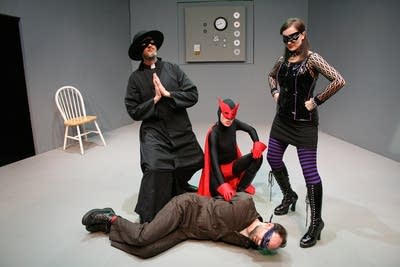Collective's original productions draw new crowds to theater
Go Deeper.
Create an account or log in to save stories.
Like this?
Thanks for liking this story! We have added it to a list of your favorite stories.

Minneapolis-based Workhaus Collective is meeting the challenge theaters face in attracting younger, non-theatergoers.
When the weekend comes, 32-year-old Susan Schoepke likes to unwind with her boyfriend at indie rock shows. Going to the theater seems like too much of a commitment. Schoepke said, at the club, you can have a few drinks and chat up your friends, even while the music's playing.
"I feel like it's more social and if you go to watch a play, you're pretty much just watching the play," she said. "So therefore it has to be pretty good."
In early 2008, Schoepke took a gamble on the Workhaus Collective's "God Save Gertrude," a kind of punk rock adaptation of Hamlet. She and her boyfriend ended up seeing the play twice, the second time bringing several of their friends. Schoepke said the music was loud, the action intense and the theater felt more like a rock club.
Turn Up Your Support
MPR News helps you turn down the noise and build shared understanding. Turn up your support for this public resource and keep trusted journalism accessible to all.
"You know there weren't rows and rows of seats, and there was a bar and people could walk and there were musical performances and they did a really good job of making it a lot less formal," she said. "It felt like a live performance event as much as it was also a play as much as it was also a concert."
That was playwright Deborah's Stein's intention.
Stein, 32, is one of ten playwrights who make up the Workhaus Collective. Its home base, appropriately, is the Playwright's Center in Minneapolis. The writers formed the group to gain more control over the destiny of their plays and create a quicker path to the stage for their work.

Stein said at Workhaus, the playwrights make all the decisions on what the play is, who will act in it, what it will look like and how the audience will experience it.
"So when we talk about work that appeals to people beyond the average theater going audience, I think we're talking as much about the energy of what's going on in Workhaus as much as we are the subjects of the plays themselves," she said.
Workhaus makes original theater the playwrights would like to see themselves. In addition to the punky riff on Hamlet, the company has staged works on globalization, teenage abduction, and earlier this year, an award winning production about the tortured life of science fiction writer Philip K. Dick.
Its current play, "The Sense of What Should Be," is going into its final weekend. It's about a teenage comic book fanatic who becomes a comic book villain and tries to take over the world. Its author, Dominic Orlando, said every new Workhaus play comes with a new theatrical vision, which lends dynamism to the company's aesthetic.
"It's almost like having an election," Orlando said. "Like we have a new administration come in, and that administration brings the designers they like and the people they like to work with, and then the whole look changes. And I think that just lends itself automatically to vitality."

The Workhaus playwrights have also shown a creative knack for marketing their plays. For "God Save Gertrude," they dropped off leaflets at rock bars. For the comic-inspired "The Sense of What Should Be", they sponsored a comic book art contest. For "800 Words," the play about writer Philip K. Dick, they held a reading at a local science fiction convention that enticed infrequent theatergoer Greg Larsen and other conventioneers to the show.
"There were a lot of people that went to see it," Larsen said. "Some of them, including myself, went to see it more than once."
Workhaus Collective members admit they can be bolder in their programming because they don't have a subscription audience. In other words, they don't have to worry about whether plays will appeal to season ticket holders.
They also keep ticket prices close to what it costs to see a rock show, charging $8 to $15 depending on what you can pay. City Pages Theater Critic Quinton Skinner said all these strategies wouldn't matter if Workhaus plays didn't work on stage. But, he said, they do.
"They're very sophisticated theater people," Skinner said. "Their casting is excellent, the direction is good, [and] the sets are really top notch for a small theater. Aside from being original work, it's a very good, sophisticated product."
Workhaus Collective's next play arrives in March. It's a romantic comedy set against the backdrop of the music industry. It's called "Music Lovers," and a lot of the action takes place in a club not unlike First Avenue.




